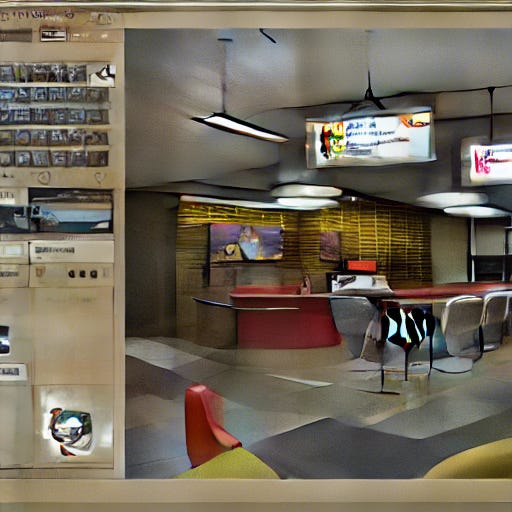Startup Cities Goodreads #4
McBasements, from parking to patios, Emergent Tokyo, agglomeration effects, remote work and housing prices, Africa's new cities, positive sum housing games, and the "Yecosystem."
You’re reading Startup Cities: a newsletter about startups that build neighborhoods and cities.
I stopped doing a monthly goodreads post a while back. Let me know in the comments if you like these or prefer more substantive articles.
Links
Toronto converted parking to patios… which promptly made 50x more money. America’s urban environments are almost criminally under-monetized. The question is, in a city operated as a startup, how long would such profit opportunities lay dormant?
The rise of the McBasement. It seems one unintended consequence of restrictions on the Earth’s surface mean that some homeowners are building underground. The WSJ is eager to ridicule one wealthy Aspen family. Pair with:
A legal mishap may have aggressively YIMBY’d Santa Monica, California: “Last week, the Santa Monica planning manager revealed that the city had accidentally abolished its own zoning code for most of the 2022 calendar year.” This led developers to apply to build two decades worth of housing in eight months.
Many focus on DAOs as the basis of a new city. But Lawrence Ong offers an interesting proposal for tokenizing mortgages to make them more affordable.
Kanye West who, ahem, recently made headlines, announced his desire to build his own Mini City called, you guessed it, the “Yecosystem.” I’m all about elites entering the Startup Cities game but… maybe not like this!
Bloomberg reviews Emergent Tokyo, a new book on Tokyo’s urbanism. How does Tokyo have such compelling urbanism and a rich web of small businesses? Cost. Space. And permission to build. I can’t help but quote in full:
“This is going to sound wild to anyone who lives in the US, but for any two-story rowhouse in Tokyo, the owner can by right operate a bar, a restaurant, a boutique, a small workshop on the ground floor — even in the most residential zoned sections of the city. That means you have an incredible supply of potential microspaces.
Any elderly homeowner could decide to rent out the bottom floor of their place to some young kid who wants to start a coffee shop, for example. When you look at what we call yokocho alleyways — charming, dingy alleyways that grew out of the black markets post-World War II, which are some of the the most iconic and beloved sections of the city now — it’s all of these tiny little bars and restaurants just crammed into every available space.”Noah Smith visits Tapei, Taiwan and offers some charming remarks on its urbanism. I’ve been lucky to spend long stretches living and working in Taipei and I consider it one of the world’s most underrated cities. Taipei offers world-class transit, walkable urbanism, an absurdly safe environment, and fantastic café culture. My wife and I still wax poetic about ending our work days, getting a UBike (a city-wide bikeshare) and riding through Taipei’s lovely alleyways for an evening of hotpot.
There’s been lots of talk that the agglomeration of benefits of cities may be disrupted by remote work and collaboration technologies. Not so, says Ben Southwood in Works in Progress:
The World Bank discovers that cities can be operated as profitable enterprises in a new-ish working paper “Private Cities: Implications for Urban Policy in Developing Countries.” The paper seems a bit skewed towards large-scale megaproject type developments. But can I really complain about this idea inching towards the mainstream?
The Federal Reserve Bank of SF argues that remote work “has been a key driver of the recent surge in housing prices.”
Startup Cities reader and Charter Cities Institute scholar Jeff Mason has an interesting survey of new cities in Africa. In particular, he shows that African entrepreneurs are using the built environment to develop (and keep) Africa’s talent close to home.
Bank branches are privately funded public financial infrastructure, argues Patrick McKenzie. There’s some interesting analysis of how banks pick locations for branches, why mostly empty parking lots at these branches are “close to optimal.”
I have a weird interest in the Karen region of Myanmar because of the “Shangri-La with Landmines” story I told here. The region’s seedy side is once again in the news, now with reports that a special economic zone in the region is responsible for human trafficking. Yikes.
The Dubai International Financial Center, which many consider a gold standard for “governance as a service,” announced their new tejouri offering. The digital platform seems to be a combination of typical e-gov services (uploading wills and titles) and crypto-oriented products.
A delightfully wonky history of how county and city governments came to be.
The always-excellent Brian Potter offers a deep dive into NEPA — likely one of the most damaging (though well-intentioned) pieces of legislation in American history:
Startup Cities reader Joel Anderson served up two great pieces recently. The first is about how we might transform the intensely negative-sum market of housing into a positive sum game:
Joel’s second piece is on how transit reshapes cities. It put words to a feeling I’ve had over the years: you can be “a 5-10 minute drive” from a lot of places and still feel very far away from them. The subjective experience of walking or biking seems to change how you perceive distance and your relationship to things around you.
Thanks for reading and don’t forget: Startups should build cities!









